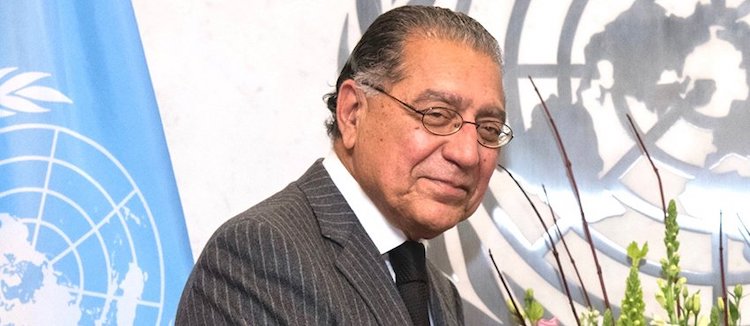
By Ramesh Jaura
BERLIN | NEW YORK (IDN) — UN Economic and Social Council (ECOSOC) President Munir Akram has called for a ‘Coalition of the Willing’ to promote agreement at the global level, on a specific set of early actions to provide fiscal space and supplementary liquidity to developing countries suffering the disastrous impact of COVID-19.
In an email interview with IDN, Mr Akram said speedy actions should include comprehensive debt suspension, debt restructuring for countries in current or potential debt distress, creation of new Special Drawing Rights (SDRs) worth $500 billion and redistribution of unutilized SDR quotas to developing countries. (P 30) CHINESE | JAPANESE TEXT VERSION PDF | KOREAN | P0RTUGUESE | TURKISH
Special drawing rights are supplementary foreign exchange reserve assets defined and maintained by the International Monetary Fund (IMF).
ECOSOC President also called for an expansion in concessional lending including by International Financial Institutions (IFIs), comprising multilateral, regional and national development banks with international operations, implementation of the 0.7% Official Development Assistance (ODA) target, creation of a Liquidity and Sustainability Facility to provide low-interest loans to developing countries, and mobilization of $100 billion in climate finance annually.
The coalition of the Willing would include the Group of Seven (G7), the Group of Twenty (G20), the Paris Club and the IMF Board, said Mr Akram who is also Pakistan’s Ambassador to the UN.
Meanwhile, the G7 economic powers, who control a little under half of the world’s economy, on February 19 agreed to “intensify cooperation” in response to the coronavirus pandemic and increase funding commitments for the rollout of vaccines in the world’s poorest countries to $7.5 billion.
German Chancellor Angela Merkel said after the G7 leaders held a virtual meeting that fair distribution of vaccines was “an elementary question of fairness” and announced funding support worth $1.5 billion.
A new study has taken up cudgels against vaccine nationalism that is haunting the vaccines-haves. The report is commissioned by the Research Foundation of the International Chamber of Commerce (ICC).
The study found that the global economy stands to lose as much as $9.2 trillion if governments fail to ensure developing economy access to COVID-19 vaccines, as much as half of which would fall on advanced economies.
The study clearly demonstrates the economic case to invest in the Access to COVID-19 Tools (ACT) Accelerator, the global collaboration to accelerate the development, production, and equitable access to COVID-19 tests, treatments, and vaccines.
Strikingly, a US$ 27.2 billion investment on the part of advanced economies — the current funding shortfall to fully capitalize the ACT Accelerator and its vaccine pillar COVAX — is capable of generating returns as high as 166x the investment, found the study.
On his part, ECOSOC President has also proposed the creation of a public-private partnership (PPP) to accelerate investment in sustainable infrastructure in developing countries. Consultations are currently underway, he said.
The facility would also utilize the UN’s Resident Coordinator system: a vast network of agencies working on development issues in more than 130 nations worldwide.
“They are excellent instruments to be able to identify the possible infrastructure projects, to help the developing countries build the capacity to formulate good pre-feasibility and feasibility studies for those projects, and the facility would be designed to find the right partners for those projects in the investment world,” Mr Akram said.
Mr Akram expressed the hope that “the forthcoming ECOSOC events will see the discussion of the financial needs of the developing countries” and expects these to “advance agreement on some of the above-mentioned urgent actions”.
He announced that ECOSOC will convene several forums this year where it is hoped countries will make “ambitious decisions” to respond to the fallout from the pandemic and to address climate change and achieving the Sustainable Development Goals (SDGs) targets.
The meetings will include a Financing for Development Forum in April, with the Science, Technology and Innovation Forum taking place the following month, culminating with the annual High-Level Political Forum in July.
The importance of such events lies in the fact that the Economic and Social Council is at the heart of the UN system to advance the three dimensions of sustainable development – economic, social and environmental.
The concept of creating the ECOSOC at the time of the birth of the United Nations was that on the one side, the Security Council was conceived as an organ that would promote collective security and enforce peace in the world. The Economic and Social Council, on the other hand, was designed to promote peace through international economic cooperation.
One of the framers of the UN Charter was the (then) United States President Franklin Delano Roosevelt. And his conception, which he voiced at the time, was that economic instability was like a disease and that if one country had it, then others would be affected.
So, the Charter says very clearly that the objective of the Economic and Social Council is to “promote better standards of living in larger freedoms”.
Subsequently. ECOSOC is the central platform for fostering debate and innovative thinking, forging consensus and cooperation on ways forward and coordinating efforts to achieve internationally agreed goals. It is also responsible for the follow-up to major UN conferences and summits.
Since the Charter’s adoption, the entire system of international cooperation on economic, social, health, humanitarian and development issues has been created under the umbrella of the Economic and Social Council.
Today, twenty international organizations, regional commissions, and autonomous entities report annually to the Economic and Social Council. [IDN-InDepthNews – 22 February 2021]
Photo: Munir Akram, Seventy-sixth President of the Economic and Social Council. Credit: UN ECOSOC
IDN is the flagship agency of the Non-profit International Press Syndicate.











